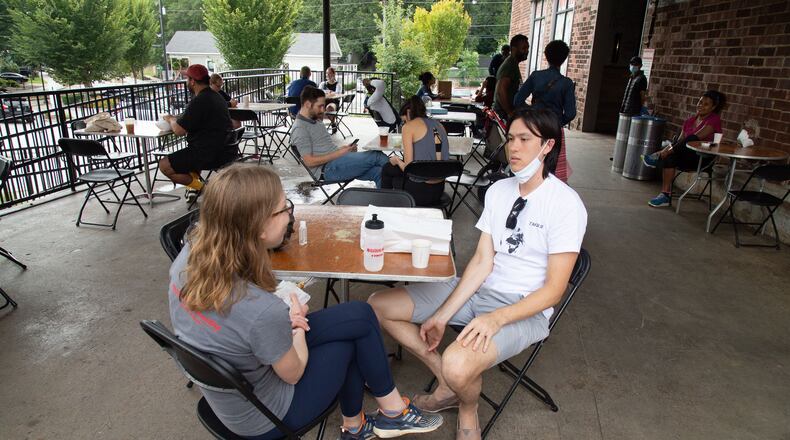The $900 billion pandemic relief bill that Congress unveiled Monday provides short-term economic relief to individuals and businesses. Several items in the relief package will benefit restaurants, including a second round of access to the Paycheck Protection Program.
The announcement comes nearly eight months after a first round of funding was approved. During that time, restaurants stayed afloat with takeout and modified on-premises dining. Yet, Atlanta eateries recently have been forced to make hard decisions about how to navigate the coming winter months.
Earlier this month, chef-owner Joey Ward announced that his Georgia Boy and Southern Belle would go on an indefinite hiatus, beginning Jan. 1. Finding themselves cash-strapped, longtime Atlanta restaurants Manuel’s Tavern and the Colonnade both turned to the local community for financial help through Go Fund Me campaigns. While both fundraising efforts were successful, dozens of Atlanta restaurants have not been able to weather the COVID-19 storm, and permanently have closed.
The federal stimulus package may help many of Georgia’s nearly 19,000 restaurants, two-thirds of which are located in greater Atlanta. The bill targets restaurant relief with enhanced PPP loan provisions, providing businesses with a forgivable loan up to 3.5 times monthly payroll costs, and makes PPP loan expenses tax-deductible. It also limits funding to restaurants that do not employ more than 300 workers at a single location.
“The action taken by Congress today will keep tens of thousands of restaurants from closing in the coming months,” Tom Bené, president and CEO of the National Restaurant Association, said in a prepared statement. “A second round of PPP, combined with unique enhancements for the restaurant sector, will provide critical access to capital. … However, the long-term economic challenges facing independent, franchise and chain restaurants will not end with the new year, and we will continue to press federal and state leaders for the support that will put us on the road to recovery.”
The relief package may help the 37% of Georgia restaurant operators who said in a recent National Restaurant Association survey that they were unlikely to be in business six months from now without additional federal assistance, while 27% said they were considering temporarily closing their restaurants until the pandemic subsided.
“We have spent the last month going to cities, talking to mayors, giving communications about what they can do to keep restaurants alive,” Georgia Restaurant Association CEO Karen Bremer said Friday in a phone interview. “The big issues: Everyone has to renew liquor licenses, permits, down payment for liability, workers comp and health insurance right now. Lots of restaurants are having to make the decision: Am I going to have to pay everything now?”
Some cities have taken steps to lessen the financial burden on restaurant operators. Brookhaven is awarding $5,000 grants to assist restaurants with liquor license fees, while Athens has reduced liquor license fees by 50% and codified the reduction through 2022. Savannah recently created a plan to allow businesses to pay for their alcohol licenses in three installments during the first quarter of 2021.
The Georgia Restaurant Association also has requested that the state Department of Public Health consider hospitality and tourism employees as part of the critical workforce during Phase 1-B of the distribution of COVID-19 vaccines. During the pandemic, employees in this sector have been designated essential workers. Pre-COVID-19, the industry employed about half a million people in Georgia, nearly 11% of the state’s workforce.
The announcement of the pandemic relief bill comes the same day that the National Restaurant Association, James Beard Foundation and Food & Society at the Aspen Institute released a diner code of conduct, aimed at helping maintain a safe environment for patrons and employees at restaurants that are still operating. The four-part code asks diners to wear masks when not eating, respect management’s right to refuse service to those who will not wear a mask, adhere to physical distancing from staff and other guests, and cancel or reschedule if they have been exposed to COVID-19 or have felt symptoms in the previous three days.
About the Author
The Latest
Featured


